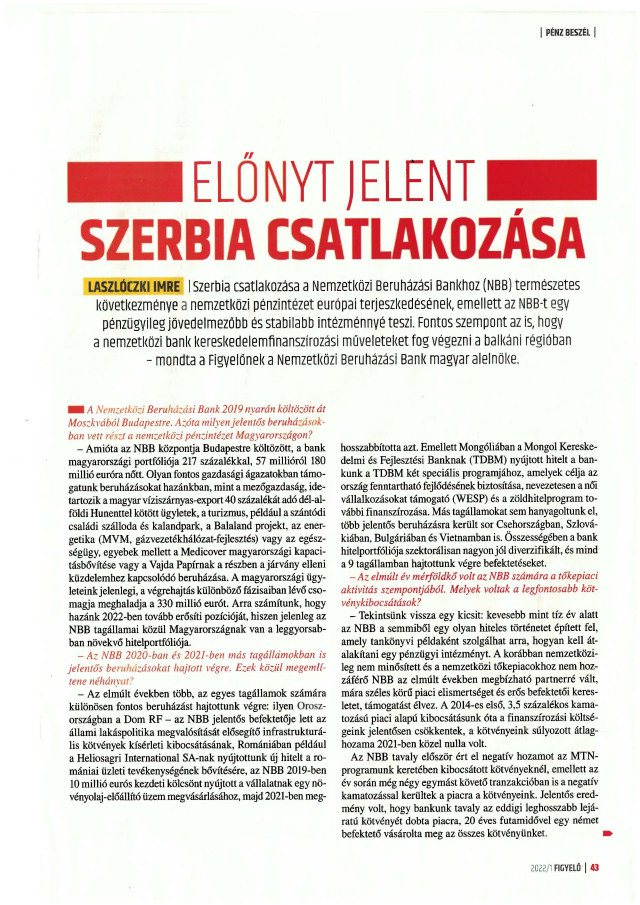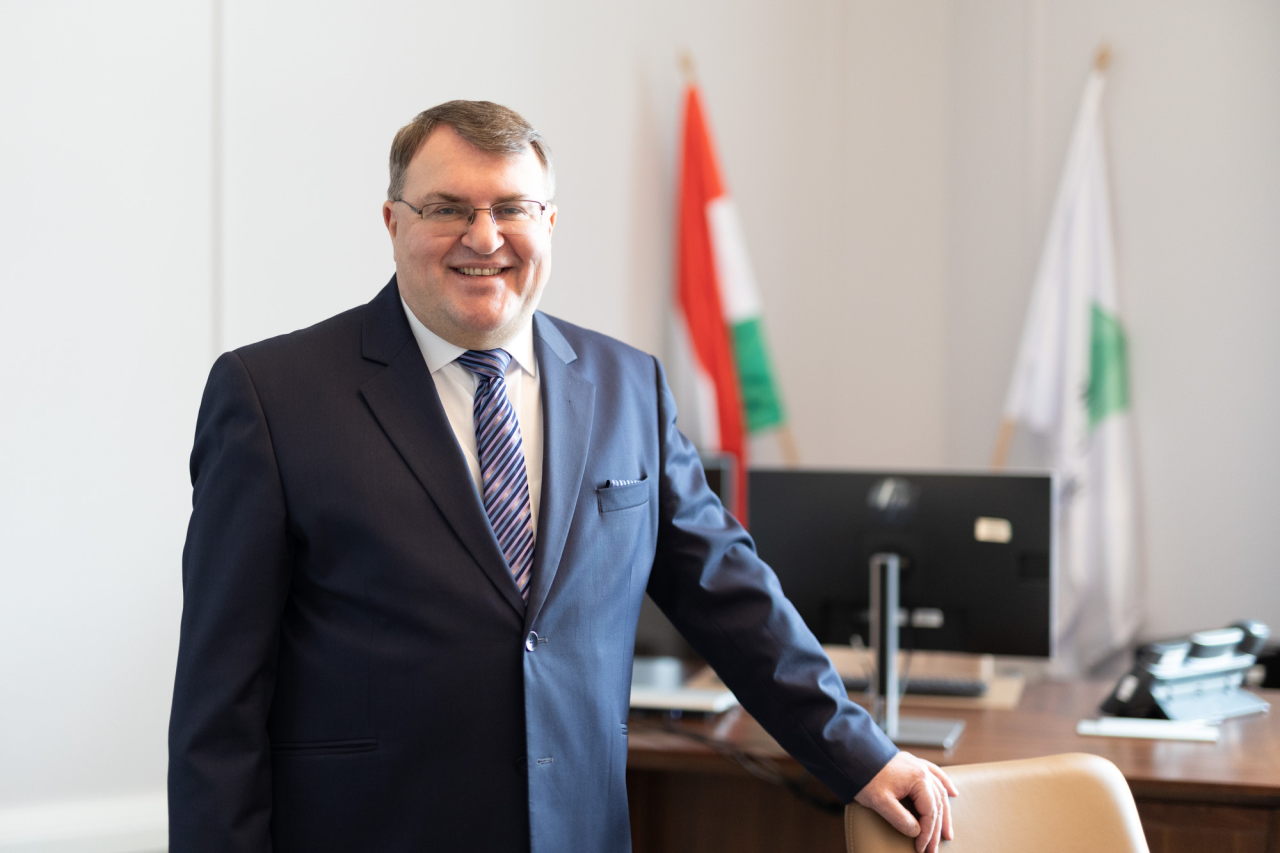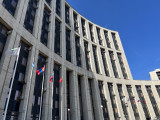IIB Deputy Chairperson IMRE LASZLÓCZKI spoke to Figyelo magazine: Serbia's accession to International Investment Bank (IIB) is a natural consequence of the European expansion of international financial institution.

IMRE LASZLÓCZKI: Serbia's accession to the International Investment Bank (IIB) is a natural consequence of the European expansion of this international financial institution, and it also renders the IIB a more financially profitable and stable institution. Another important aspect is that the international bank will conduct trade financing operations in the Balkan region, explained the Hungarian Deputy-Chairman of the International Investment Bank to Figyelő.
– The International Investment Bank moved from Moscow to Budapest in the summer of 2019. What significant investments has the international financial institution been involved in since then in Hungary?
– Since the IIB's headquarters moved to Budapest, the bank's Hungarian portfolio has increased by 217 percent, from 57 million to 180 million euros. We support investments in important economic sectors in our country, such as agriculture (including transactions with Hunent, a company located in the Southern Great Plains and responsible for 40 percent of Hungarian waterfowl exports), tourism (such as the Balaland project, a family hotel and adventure park in Szántód), energy (MVM, gas pipeline network development) and healthcare (including Medicover's capacity expansion in Hungary and Vajda Papír's investment that is partly related to the fight against the epidemic). Our current package of transactions in Hungary, which is at various stages of implementation, exceeds 330 million euros. We expect Hungary to further strengthen its position in 2022, as it currently has the fastest growing credit portfolio among IIB member states.
– The IIB has also implemented significant investments in other member states in 2020 and 2021. Could you please name a few of them?
– In recent years, we have implemented several investments of particular importance for specific Member States: such as Dom RF in Russia, where the IIB became a major investor in an experimental issue of infrastructure bonds to support the implementation of state housing policy; in Romania, for example, we provided new credit to Heliosagri International SA to expand its business activities in Romania, and the IIB provided an initial loan of 10 million euros in 2019 to the corporation to purchase a vegetable oil production plant, which was extended in 2021. In addition, in Mongolia, our bank provided credit to the Mongolian Trade and Development Bank (TDBM) for two special TDBM programs aimed at ensuring sustainable development in the country, notably continued financing of the Women Enterprise Support Program (WESP) and the green credit program. We have not neglected other member states either, with several major investments taking place in the Czech Republic, Slovakia, Bulgaria and Vietnam. On the whole, the Bank's credit portfolio is very well diversified in terms of sectors and we have made investments in all 9 member states.

– Last year was a milestone for the IIB in terms of capital market activity. What were the most important bond issues?
– Let us look back a little: in less than ten years, the IIB has built from scratch a credible story that can serve as a textbook example of how to transform a financial institution. The IIB, which was previously not rated internationally and had no access to international capital markets, has become a reliable partner in recent years, and now enjoys broad market recognition and strong investor demand and support. Since our first market-based issue in 2014 at 3.5 percent interest, our financing costs have fallen significantly, with the weighted average yield on our bonds close to zero in 2021.
For the first time last year, the IIB achieved negative yields on bonds issued under our MTN program, and in four other consecutive transactions during the year, our bonds were also placed on the market with negative interest rates. It was a significant accomplishment that last year our bank issued its longest term bond ever, with a German investor buying all of our bonds with a 20-year maturity.
It is worth noting that the issuance history of the International Investment Bank is also closely linked to the development of local foreign exchange bond markets in the member states. The bank makes frequent issues in five currencies, in addition to the euro, in the Russian ruble, the Romanian leu, the Hungarian forint and the Czech koruna. I should note that the IIB's support for the development of local capital markets has been recognized over the years with several prestigious awards, including one by the Budapest Stock Exchange in 2019.
– What does this mean in practice?
– As I mentioned, our international bank had no presence in the capital markets until 2014. Our bonds are now being traded in Dublin, Vienna, Budapest, Bucharest, Moscow and Prague, and our investor base is steadily expanding (we now have more than 180 institutional investors, including German, Dutch, Czech savings, pension and other investment funds), reflecting the growing confidence in us and our strengthening market position. The total amount of bonds issued and purchased by the bank since 2015 – i.e. “financing attracted” – exceeds 2.5 billion euros. Our investor base is steadily broadening – for example, the share of German investors in the IIB's long-term financing has now increased to 14 percent – and the investment bank has recently experienced real demand from entirely new geographic regions, such as Asia and the Middle East. The implementation of our long-term financing strategy is a success story. This also represents a new qualitative leap, as the sustainable development of the IIB is no longer constrained by financing options.
– One of the most significant events of the past year for IIB was Serbia becoming a shareholder state in December 2021. Why is this especially important for this international financial institution?
– Serbia's accession is a natural consequence of the Bank's European expansion. This is a country that has strong historical, commercial and economic ties with our Member States, and it is also worth noting here that neither the Republic of Serbia nor its predecessor, Yugoslavia, was a member of the Comecon. With regard to Serbia, we have carefully examined the capital market, geographical, social and economic aspects and we can say that this accession is a very logical step in all respects. The country's accession will have a positive impact on the IIB's financial situation in several respects, including capitalization, diversification and profitability, and may also bring non-specific financial benefits such as strengthening the credit profile and diversifying the shareholder base. All in all, Serbia's accession will make the IIB a financially more profitable and stable institution, which will benefit all shareholders. Another important aspect is that the bank will be conducting trade finance operations in the Balkan region, which will not only expand the general geographic scope of activities of our financial institution, but also bring new transactions by establishing new relationships.
From a macroeconomic viewpoint, the partnership between the IIB and Serbia is beneficial for all parties involved and is being implemented at a time when the country is steadily climbing the world economic ladder. We consider it particularly noteworthy that Serbia is one of the few countries in the world that has been upgraded in terms of public debt management during the Covid period, with a general average rating of BB+. This is very similar to our country's comparable ranking in 2015, when Hungary rejoined the IIB. Moreover, Serbia is an excellent partner for the IIB not only because of its common borders with three of our current member states, but also because it is projected to be one of the fastest growing economies in Europe. It is a telling sign that even during the epidemic, their economy shrank by only 1 percent, and in 2021 it grew by more than 6 percent.
Another important aspect is that Serbia's accession has a positive impact on the bank's shareholder structure. Now 6 out of 10 member states are European, underlining the European character of the credit institution. As regards the share of the bank's capital, Serbia will be at the level of other European shareholders.
– Recently, as part of the Clean Water, Happy Tisza program, experts and volunteers from the PÉT Cup cleaned up around 300 areas of domestic floodplain forests along the river from pollution such as discarded plastic bottles, and the whole program was financially supported by the International Investment Bank. Will this project continue? Do you also carry out environmental activities in other shareholder states?
– The Clean Water, Happy Tisza initiative is the first project we have supported since the Bank relocated to Europe. This partnership is outstanding compared to previous ones for several reasons. The Tisza River flows through five countries, three of which are IIB member states, and is thus directly linked to the ecosystem of one of the largest aquatic arteries in Central and Eastern Europe, and thus to the well-being of tens of millions of people living in our countries. In the past two years since we have been working with the PÉT Cup, we have witnessed the tremendous efforts of enthusiastic volunteers who work tirelessly to keep the Tisza free of plastic waste, and I have to say that they have achieved impressive results. The impact of the initiative can be seen not only along the river, but also in the whole Danube Basin and the Black Sea as a result of the project.
The interim results achieved and the cross-border nature of the project directly contribute to sustainable development goals, such as combating climate change, and this has led us to the decision to make this the IIB's long-term environmental experimental program in Central and Eastern Europe. We have already discussed the next steps of this very important work with the PÉT Cup, and the IIB has committed to providing around 26 million forints in additional resources for related programs in 2022.
Our support policy is an essential part of the IIB's activities and has traditionally focused on the environmental programs of our shareholder states. Since 2015, the bank has provided financial support for several vital initiatives, such as peatland restoration in Mongolia and Russia (with the latter project winning the UN Climate Change Action Award for Excellence), river ecosystem restoration in Slovakia, education and volunteer movements in Romania. Prestigious international environmental organizations such as WWF and Wetlands International are longstanding partners of IIB in the implementation of these projects.
– The new year has only just started, but can you give us some preliminary figures on the IIB's performance in the past year?
– The relevant audited financial figures are traditionally published in about a month, but we can already say that 2021 was a fairly successful year for IIB. Most of the major objectives set out in the current strategy for the end of 2022 have already been achieved, a year ahead of the planned deadline. Our credit and document transaction portfolio exceeds 1.3 billion euros, and our assets are currently worth around 1.8 billion euros, which has increased more than fivefold since the bank was relaunched in 2012. The level of non-performing loans remains one of the lowest among institutions comparable to us, at just 2.3 percent. The quantity and quality of our treasury portfolio is constantly increasing and improving. At the International Investment Bank in 2022, we will seek to further increase and strengthen our positions in the region and, with the new shareholder “on board”, significantly expand our geographical presence.
BALÁZS TÓTH
IMRE LASZLÓCZKI:
CAREER
-Hungarian Deputy Chairperson of the Management Board of International Investment Bank.
-Born on 26 September 1961 in Paks, is married and has two sons.
-Graduated in 1987 from the Faculty of Diplomacy of the Moscow University of International Relations, majoring in Arabic and English.
-Between 1987 and 2019, he was employed by the Ministry of Foreign Affairs, holding management positions since 2003. Foreign posts included Baghdad, Tripoli, Rabat Kuwait City, Moscow, Lisbon, Nur-Sultan (Astana), Baku, Rome, and Accra. Represented Hungary as ambassador in Kazakhstan, Kyrgyzstan, Tajikistan and Azerbaijan.
-In 2019, he joined the International Investment Bank, which relocated its headquarters to Budapest in the same year, and as the Hungarian Deputy Chairman of the IIB's Board of Executive Directors, he oversees the work of the department responsible for strategic issues, international relations as well as information and marketing affairs.
-He speaks English, Arabic, Russian, Portuguese and Italian.
-Awarded the silver medal of the Dostyk (Friendship) Order in recognition of his work in Kazakhstan. Hobbies include football, tennis and reading.
